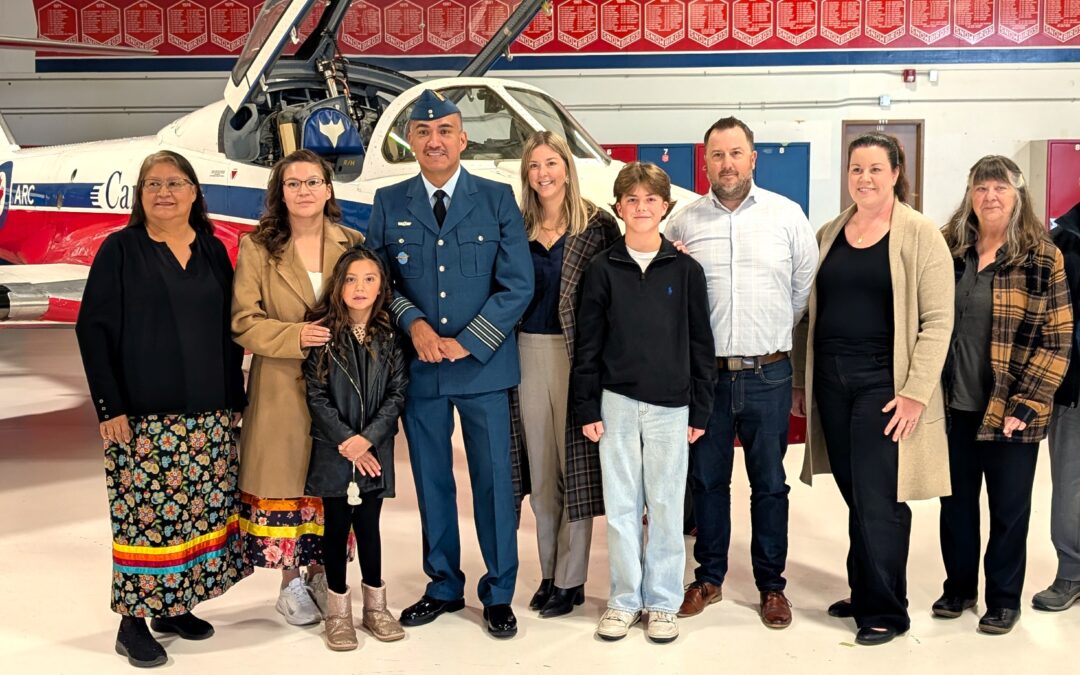Photo: Chief Evan Taypotat (in uniform) joins members of his family for a photo at 15 Wing Moose Jaw following the ceremony appointing him as Honorary Colonel of 431 Air Demonstration Squadron on Oct. 17 / by Aaron Walker.
By Aaron Walker
Local Journalism Initiative Reporter
Windspeaker.com
Chief Evan B.G. Taypotat of Kahkewistahaw First Nation was formally invested on Oct. 17 as Honorary Colonel of 431 Air Demonstration Squadron, better known as the Canadian Forces Snowbirds.
Based at 15 Wing Moose Jaw in Saskatchewan, the aerobatic team’s mission for the past five decades has been to showcase Canada’s military precision, skill and teamwork through public performances.
The appointment of the honorary colonel title marks a first. Taypotat, a former Canadian Army captain, educator, and leader from Treaty 4 territory, is the first Indigenous person to hold the position with the Snowbirds. It’s a step that he and military leaders say reflects an evolving understanding of reconciliation within the Canadian Armed Forces.
Standing inside Hangar 7 where the Snowbirds’ red-and-white Tutor jets are housed, Taypotat shared a childhood moment that came full circle.
“You know, to be in this position feels really, really cool,” he said following the ceremony. “Growing up on the First Nation of Kahkewistahaw, we don’t really do any of these things. We were poor. Growing up, we didn’t know we were poor, but we’d see the fighter jets flying over our First Nation back in the day. We stood there and watched them, and now to be here today, 40 years later in this role … it’s really cool.”
The journey to that moment began nearly two years ago when Colonel Daniel Coutts, former commander of 15 Wing, reached out to Kahkewistahaw First Nation as part of the Air Force’s reconciliation outreach. Taypotat hosted the visit and gave a tour of the community’s school.
“I remember one of the kids asking him what he flew, and he said, ‘A Griffon’,” Taypotat said. “That visit set the relationship in motion and it gradually came to this about 18 or 19 months later.”
Born in Grenfell, Sask., Taypotat’s path combined discipline, service, and education. An official military biography explained that he joined the Canadian Armed Forces in 1998 through the Bold Eagle program, an initiative that provides Indigenous youth with military training while grounding them in their cultures and communities.
Graduating at the top of his class, Taypotat went on to serve with Princess Patricia’s Canadian Light Infantry, deploying to Afghanistan in 2011 before retiring with the rank of captain.
He later returned to Kahkewistahaw First Nation to teach and become principal of the community’s school. In 2017 he was elected chief, and he continues to advocate for sovereignty, self-sufficiency, and education rooted in Indigenous identity, according to the Nation’s website.
Today, he holds a master’s in educational administration from the University of Regina and an executive master’s in Indigenous business leadership from Simon Fraser University.
As Taypotat explained, the honorary colonel role is not just ceremonial. It is an opportunity to build understanding between Indigenous and non-Indigenous Canadians through direct, personal connection.
“I think the goal would be to help CFB Moose Jaw, and maybe the Canadian Air Force, understand what reconciliation is,” he said. “Everybody concentrates on September (for the National Day for Truth and Reconciliation) and we always wear orange shirts, but it’s more than that. It’s got to be every month, weekly. We as First Nations people don’t want it (as the focus) every day … but we certainly don’t want the atrocities swept to the side.
“We want to make sure … that people are educated about it, because if people are educated about it, it becomes a better Saskatchewan.”
That sense of learning and reflection is precisely what military leaders said the honorary colonel program is designed to foster. Lieutenant-Colonel Guillaume Paquet, commanding officer of the Snowbirds, described the appointment as “a proud and historic moment” for the squadron and the Canadian Armed Forces.
“This is the first time that we actually have an honorary colonel who comes from a First Nation. This is truly a step in the right direction (given) our dark past, (and) it’s a step forward towards reconciling the future,” Paquet said.
He explained that honorary colonels serve as advisors and community ambassadors.
“(The role) helps us bridge the gap between military service and the community — the people we serve,” he said. “In this particular case, for example, it’s about better understanding the First Nations community, but it’s also for them to understand our life.”
